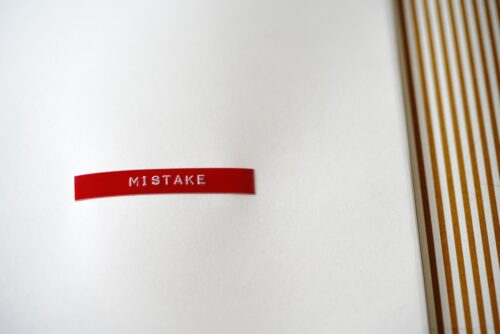I’ll never forget sitting through a church service and listening as the preacher, over and over again, with disgust talked about how sick people in pornography are. The men who watch it are sick. The women in it are sick. The men in it are sick.
Sick. Sick. Sick.
I was torn between wanting to crawl out the back door and standing up and telling him to zip it. I did neither.
Yes, we should be talking about pornography in church. Just not like that. This is just one of many mistakes we can make, whether in ministry or not, when it comes to addressing the sins of lust and pornography.
My momma always said, “If you’re not part of the solution, you are part of the problem.” Here are 5 common mistakes that don’t solve anything.
Mistakes we make when we talk about pornography
1. We Type It.
I don’t mean we sit at a typewriter; I mean ‘type’ as in ‘stereotype’ or ‘type casting’ for a movie. We have this stereotype in our heads of porn addicts and it looks like this:
Middle-aged white male
Atheist
Single
Living in his mother’s basement
Serial killer/rapist
Where we came up with such an ugly typecasting of porn addicts is completely beyond me. But here’s the problem with typecasting: it makes us delusional. I could get comfortable with the idea that since I don’t know any middle-aged white male atheists who are serial killers, that I really don’t know anyone who struggles with pornography. That would be a very untrue statement. On the flipside, because of this typesetting, I can make untrue assumptions about the character of porn addicts. Let’s get the facts straight here:
Fact: Women struggle with pornography.
Fact: Pastors struggle with pornography.
Fact: Husbands struggle with pornography.
Fact: Wives struggle with pornography.
Fact: Christians struggle with pornography.
2. Judgement more than Grace.
We Christians have become known for our condemning, judgmental approach to everything. We are the Pharisees of the 21st century, pacing around town with our bag full of rocks just waiting to stone someone. It is interesting to note that Christ dealt with sexual sinners while He was here, and He was quick to extend mercy and grace. We, however, are quick to make assumptions, and quick to pass judgment. We are quick to look at porn addicts as freaks, as sick disgusting perverts. So are you. We are all sinners. All.
Is there right and wrong? yes. And someone’s struggle with porn is not any more ‘wrong’ than your struggle with pride, or envy, or lying. So drop the bag.
3. It’s Someone Else’s Problem… Somewhere Else
This is the human trait, “Oh that will never happen to me.” We never think anything bad will happen to us or our family- it’s somewhere else. It’s in a different pastor’s church, a different youth group, a different marriage, a different family. Yes, pornography is out there, but it is not here. Pornography can be wherever pornography is, and it is everywhere. We need to be addressing it as a temptation of every day life because it is- right here, right now.
4. We Discredit Personal Struggle.
There’s debate about whether or not pornography can actually be an addiction. Some will say that it can’t be, others say it can. Speaking from personal experience, I’m in agreement with the latter. This is an addiction. You cannot look at someone who confesses to a porn addiction, tell them to knock it off and end the conversation. You cannot look at a wife who has caught her husband in porn and tell her to get over it.
If someone comes to you for help, it stands to reason that person needs help. Don’t just tell them to stop. If sheer determination were enough to break these chains, they would be broken.
5. We Have no Hope
I’m a big fan of hope. I like hope. We all like hope. We thrive on it.
As Christians, hope is a motivating factor for our lives. So what happens when one Christian looks at another Christian and tells that Christian that there is no hope for them? When we stand up and say that porn addicts can never get married, and porn addicts make horrible husbands/wives and even worse parents. When we tell young women without fathers that all they will ever be is unwed mothers, when we tell women who’ve had sex that they are damaged goods. When we promote this idea that hope is only for the perfect, we leave the broken without healing.
Hope is not yours to withhold.
How dare we ever feel someone is nonredeemable After being partakers of the redeeming grace upon which our faith (and hope) is built, we should have even more desire to see that grace redeem broken lives. As Christians, it should be our mission to find the broken, love the broken, and watch God redeem the broken. We should be sources of hope, grace, and healing for those in need.
So next time, please, as easy as it is to be completely grossed out by porn addiction, remember that trapped underneath the crushing weight of that addiction is a heart in desperate need of grace, hope, and love.







I have a tendency to agree with you, and although I agree with what you’ve said here as well, I have an amicable list of disagreements with some of your views. I’ve also dealt with a pornography addiction and an addiction to masturbation, so please do not generalize my intent or my opinions as judgemental or pharisaical.
You begin by saying that pastors (as you have heard them) have labeled any person who is a pornographer, is employed in porn, watches porn, etc. as sick; that is, morally bankrupt and detestably perverted. And although I agree with you in the matter of kindness with conviction in helping those who have realized their need, it is a bad idea, I feel, to constrain any stern or even severe rebukes against this particular sin. Reprove, rebuke, exhort — this is the charge which every preacher (of which I am unyieldingly convinced is every born again soul) must keep; this includes exposing to shame the sin and the willful sinner. To conclude my thought, there should not be a softening toward these evils, nor on the evil doers. To do so would, in the long run, cause a marginalization of the disgusting wickedness of the sin, and purity itself would be marginalized. This is why Spurgeon and Moody and MacArthur and John R. Rice have been so effective.
The reason (as I can see it) for such typecasting is because any notorious person who has fallen under the category of porn addict has generally been a member of your list. Take Ted Bundy, for example. Moreover, if we can be honest among ourselves, it is true that atheistic (viz. people who are not even religious, people who hate the idea of religion and a god, people who ignore religious ideas), single men, and rapists are porn addicts. They are the picture of the results of a porn addiction to a disturbed mind. Nevertheless, you are correct, that pastors, Christian men and women, and others do struggle, yet the word Struggle is necessary in considering this specific set. They can be considered to be in a different category all together, only because of their spiritual mindset.
After this, you make a claim that I’ve noticed you’re wont to declare, that much of the Christian churches today are full of hypocritical judgement on poor, helpless, depressed sinners. Although I do not disagree that individuals can show undue judgement on those who would be rather helped by (as your say) grace and mercy, swift condemnation of this sin is upmost, and should never be discarded.
I have to leave. I’ll continue this next week, if not sooner, God willing.
Please don’t be upset ;D
I think you have aptly chosen your nickname, sir.
I don’t usually respond to comments like this here. My normal course of action would be to do this via e-mail, but in all fairness, I wanted to have a public clarification of this:
I don’t believe I ever made the broad-sweeping claim that pastors label people this way. I shared one instance that is very present in my mind, and used it as an example for a mistake anyone can make (not “a mistake every pastor makes). While I agree that yes, there is truth in that statement, and yes we are called to exhort; we are called to speak the truth and exhort in love. We are not called to tirade, but to speak words that edify and are full of grace. Most addicts are well aware of their need, and well aware what they are doing is wrong. They don’t need someone to keep reminding them. If knowledge of right and wrong were all it took, they wouldn’t do it. By all means, call them sick, but then offer them help. Added to that, I would say when those speaking are equally as passionate about how we are all sick, perverted sinners, from the ones who lie to the ones who steal to the ones who envy to the ones who look at porn, then we have the whole truth. When sin itself is the wrong, and a not a specific sin, that is the foundation for the Gospel.
The reason for such typecasting is irrelevant. The fact is, there is typecasting and there shouldn’t be. I would caution against reversing the typecasting- by saying all atheists and single men are porn addicts. I’m not sure if that’s what you meant, but it seems to be what you said.
As for your third point, I believe your, again, broadsweeping generalization is unfounded, and this is why: https://beggarsdaughter.com/why-isnt-the-church-talking-about-women-and-lust/ and this https://beggarsdaughter.com/we-cry-out-for-prodigals/ and this https://beggarsdaughter.com/i-lead-i-lust-am-i-a-hypocrite/ and a majority of other recent writings.
One of the missions here is to help equip the church to help these women, not to condemn the church for being hypocritical, because I don’t think it is. I think the church is uneducated.
I don’t believe churches are full of hypocritical judgment; I believe they fail to be the hands and feet of Christ because they don’t know how. Do I believe that some are often too busy protecting their pews from dirt instead of getting their hands dirty? Sure. I agree that we need to be speaking out about this sin, in a balanced truth-and-love approach. For the most part, churches are not talking about this at all. That is a point I am wont to declare, because it is fact. Yes, it is horrible, but here is a way out. That is Biblical exhortation. Biblical exhortation encourages in Christlikeness, not damns in sinfulness.
I hope that clears some of that up.
As for the rest, you are welcome to e-mail me.
I think there are two sides to this issue. I would like to share a bit of my story.
On one side, there *are* people who know they’re doing something wrong, and they don’t care. Or maybe they don’t realize it’s an addiction, but they would care if they did. Either way, it’s not both. Those people do need to be reached by rebuke, either to push them into caring or to express it to them in terms they will understand and see in themselves.
But. On the other side there are people like me, who take rebuke seriously and end up internalizing every rebuke, aware of exactly what is wrong with them and finding themselves powerless to fix it.
When I first began dealing with this issue, I WAS TERRIFIED. I knew I could tell absolutely nobody, because everywhere I turned in the church I heard the arguments that those who watch porn are sick, twisted addicts who have something deeply, psychologically wrong with them. Or maybe are just evil. And I was neither. I was a deeply depressed young woman who had managed to find temporary solace in something that she knew was wrong, but she didn’t know how else to deal with the extreme heaviness of her heart. And then, the next day, I’d find myself even more depressed because of the crushing guilt, and, even though I knew it was wrong, I would desperately find myself once again seeking something, anything, that would let me forget how awful I felt for just a few moments, because I couldn’t stand the thought of living for days, weeks, months, or even years without a pause in the storm.
I carried this burden alone for 3 years because of my fear of facing the condemnation I’d heard my whole life.
Finally, when one female friend confessed to me, hesitantly, that she struggled with it, I burst into tears at once, because I finally had somebody I knew I could talk to without judgment.
Because of the swift and firm condemnation of this sin, I almost never got the counsel and the prayer that I needed to get out of it.
I am not alone, at least not among women. (Perhaps this is a societal gender difference – since it’s more assumed in many circles that men will deal with pornography and women will not, there may be a darker stigma for women who encounter it. I certainly felt that way.) I have since had several female friends share this issue with me, and I respond to it like I would an addiction. I’ve found this is most effective for both myself and for them.
As an addict, I didn’t need to be told I was wrong. I KNEW that. I needed someone to tell me I can survive without it. I needed someone to give me something to replace it with. I needed someone I could call up when I felt the temptation who would talk me down. For people like me, whose addiction is actually triggered by depression and guilt, condemning or calling it out as sin actually exacerbates the problem and makes it more likely that I will stumble that day.
Obviously everyone is different. But my experience (and that of many of these friends) has been that there is no lack of condemning of this sin in the Christian church. The scales are not balanced. They are heavily weighed on one side, where judgment far outweighs the grace. Finding a better balance doesn’t have to mean condoning. It just means extending grace to the people who have already been listening, and making sure they KNOW that if they need to talk to somebody, they can get help without being made to feel more miserable about themselves than they already do.